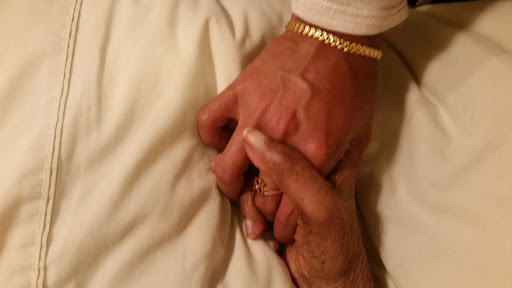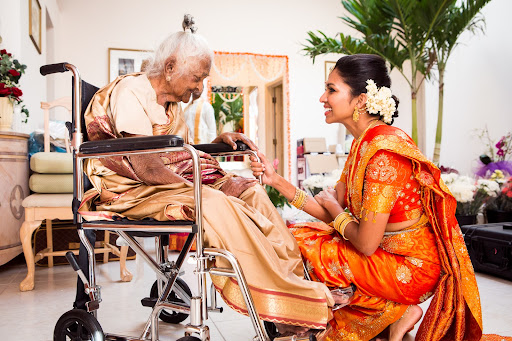Dear friends,
For the last two decades of her life, my grandmother was on Medicaid. My ammammah was a source of eternal optimism for the family, and the type of person who never asked for much and gave freely. She would appear to be quiet in most settings, yet had the fierce courage that allowed her to step on a plane by herself well into her 60s to travel to a country where she didn’t know the language.
The support Medicaid provided allowed our whole family to address her health needs: to augment her hearing and minimize her vision loss so she could fully experience her granddaughters’ weddings and enjoy the laughter of her great-grandchildren; receive surgeries and rehabilitation after a catastrophic fall to maintain a high quality of life despite the odds; and ultimately to access in-home hospice so that she could pass with dignity after a long, well-lived life. If she were ever to have lost Medicaid abruptly, it would have been devastating for us as a family—both emotionally and financially. Would losing coverage have prevented my parents from investing in themselves by starting small businesses? Would my sister and I still have been able to attend college with our parents’ support? Thankfully we never had to make those choices.

My experience taught me that health insurance is not just a policy matter—it’s personal. And it’s not just the insured individual whose life is shaped by affordable care—medical coverage has ripples into whole families. My heart hurts now for all the individuals and families who began to lose it on April 1.
With the end of the Medicaid continuous enrollment policy instituted in the pandemic, an estimated 5 million to 14 million people will lose coverage. Nearly 7 million people could lose coverage even though they are still eligible for it. Many people won’t even know they’re disenrolled until a medical need strikes, and then they won’t know why. Beyond the harm to patients and families, this sudden slimming of the Medicaid rolls will bring a backlash onto already-exhausted frontline workers. Because, as is almost always the case with harmful policies, the person who delivers the message to those affected will not be the person who decided to end the benefit.
This change comes, cruelly, on the heels of historic gains in insurance coverage, in which coverage rates for adults across races and ethnicities reached record highs—with particularly powerful gains for Black and Hispanic people. Now, many of the most vulnerable patients, including children, people with limited English proficiency, and people with disabilities, are the ones likely to lose their enrollment. Not surprisingly, a disproportionate share of those facing disenrollment are Hispanic or Black.
The inequity in these losses and the harm it will cause is no coincidence. It’s not just an individual issue or a poverty issue. This rupture, like so many other causes of health and healthcare inequity, is a structural issue, rooted in political and societal systems established by design. The euphemistically described “unwinding” of the COVID-19 public health emergency belies a deeper, more concerning policy decision to claw back an essential social safety net, rather than strengthen and expand it. It is a setback for the Upstream Movement and a source of grief for everyone who believes that all people should have an equal opportunity to thrive.
So how do we respond and regroup? By caring for individuals and families—and for ourselves—as we work to change systems.
Like the proverbial oxygen mask on an airplane, we need to care for ourselves before we can assist others. We need to allow ourselves to grieve. To rest (if we can, amid the crush of daily demands) before we rebound. And—importantly—to join together with others for comfort and ultimately for action.
This is a time to practice deliberate solidarity. Maintaining and fostering connections with each other will renew our energy during setbacks, inspire us, and help us understand each other’s lives. We need this practice not only to care for each other but also to be able to respond effectively and concretely. As a Japanese proverb says: “A single arrow is easily broken, but not ten in a bundle.”

Deliberate solidarity also requires us to ensure that efforts to address equity and social needs are substantial and structural, not performative or limited. Structural solutions can only be achieved collectively.
Let the heartbreak of Medicaid disenrollments be your cue to reach out to a loved one, colleague, friend, or family member and fill your cup for the continued fight ahead. Learn and hold each other’s stories.With that shared energy, we will work to minimize harm by making sure that people who are still eligible for Medicaid don’t lose coverage (here’s a starting point, from our friends at Families USA). And we will lay paths to change the power systems that promote harm in the first place. Because arrows, even bundled, have purpose: to hit an aim and shift the outcome of a struggle.
Best,

Sadena Thevarajah, JD
Featured content
Staff Spotlight: Erica Jones, Following Her Path and Passion to Help People
“I wish people would try to advocate for themselves more, because I feel like there's this power struggle and people don't feel like they can.”
Staff Spotlight: Kyron Pierce, The Eagle Scout with a Passion For Helping People Lead Healthy Lives
“[Health equity] is very hard work and it might be some years for us to see the fruits of our labor, but it'll be worth it when you do produce it.”
Staff Spotlight: Alejandra Cabrera, Perfectly Imperfect Artist and Health Equity Advocate
When I work with people and communities, I always think back to this sense of not belonging and it drives me to continue to do the heart-work we need to do to advance health equity.

